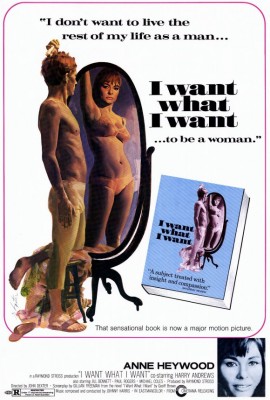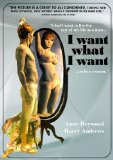| Reviews & Columns |
|
Reviews DVD TV on DVD Blu-ray 4K UHD International DVDs In Theaters Reviews by Studio Video Games Features Collector Series DVDs Easter Egg Database Interviews DVD Talk Radio Feature Articles Columns Anime Talk DVD Savant Horror DVDs The M.O.D. Squad Art House HD Talk Silent DVD
|
DVD Talk Forum |
|
|
| Resources |
|
DVD Price Search Customer Service #'s RCE Info Links |
|
Columns
|
|
|
I Want what I Want
The movie is both a product of its time and a cinematic aberration. It probably could not have been made at all had the British film industry not been in such dire financial straights in the early-1970s. At the time, virtually the only movies making money were explicit, saucy cinematic romps like Confessions of a Window Cleaner. I Want what I Want's subject matter probably appealed to financiers expecting a lurid exploitation film and may have been surprised and disappointed the end result wasn't anything like that at all. Though rated "R" in the U.S., the movie is almost tame with no nudity or explicit sex, taking its subject matter quite seriously.
Scorpion Releasing's DVD is 16:9 enhanced, a high-def transfer of inferior film elements. The presentation is okay and entirely watchable but grainy with inconsistent color, like a drive-in print that's seen better days. Included are appreciative liner notes and a Spanish trailer.
Roy (Heywood) is a real estate agent in London still living with his pompous father, "The Major" (Harry Andrews), in the large house left them by Roy's recently deceased mother. Roy hates the Edwardian airs and tiresome womanizing of The Major, with Roy preferring the company of young women to men, and throughout the film he's seen reading Simone de Beauvoir's The Second Sex. Secretly drawn to women's clothes and wearing make-up, Roy is inevitably discovered by his father, who mercilessly slaps his boy around.
Roy takes what for him is the next logical step: transitioning to womanhood on a full-time basis. Adopting the name "Wendy," he-now-she moves away and into a rooming house belonging to English teacher Margaret Stevenson (Jill Bennett), whose roomers include ladies-man Frank (Michael Coles, The Satanic Rites of Dracula) and Wendy's next-door neighbor, June (Shelia Reed, Brazil).
About the first third of the film follows Roy coming to terms with his true if suppressed sexual identity, while the rest of the picture is devoted to her pre-operative transition to Wendy. There's much dramatic tension as Wendy awkwardly tries to "pass" herself as convincingly female, yet all the while she's understandably terrified that those around her will discover her deep, dark secret.
There's also a very interesting subplot concerning Wendy's sister, Shirley (Virginia Stride, Z Cars), who's far more accepting of her brother's feminine nature, but then puts up much resistance when after many months Wendy suddenly turns up at her doorstep. "Can't you be cured?" Shirley asks. "I am cured," is Wendy's response.
Heywood, 39 years old at the time of filming, was born with a name befitting a drag queen, Violet Pretty, and was crowned Miss Great Britain under that name in 1950. As columnist Dennis Dermody points out in his helpful liner notes, Heywood was known for taking chances, co-starring in the lesbian-themed The Fox (1967), from D.H. Lawrence's novella and, later, in The Nun and the Devil (1974). In I Want what I Want, Heywood is totally unconvincing as a man, mainly because her body shape and size, along with the bone structure of her facial features, never looks anything other than female. But as Roy transitions to Wendy, Heywood is excellent: a woman playing a man learning how to be a woman.
Wendy is basically like a teenage girl entering puberty, exploring the art of applying make-up, walk in high heels, select an appropriate wardrobe, etc. Wendy initially overdoes it, dressing extravagantly when more casual wear is called for, and she really goes overboard with the eye shadow, at times approaching that Joan Crawford-banshee era look.
The fact that the filmmakers chose a woman to play Roy and Wendy rather than a man, or for that matter a real transsexual, is something of a cheat, but they were probably correct in thinking that a woman in the part would be more palatable to general audiences than a man - audiences still getting used to the idea of gay men, as homosexuality in Britain had only recently been legalized. Not long before, The Christine Jorgensen Story (1970) had starred a man, John Hansen, and reviews of that tended to focus on how ludicrous Hansen looked in women's clothes. (Sergei Hasenecz adds, "I think a movie which got this right was Dr. Jekyll & Sister Hyde, a Hammer movie from the previous year. Ralph Bates and Martine Beswick actually do resemble brother and sister [or the split masculine/feminine halves of a single person], the script is wonderfully lurid, and the movie works in unexpected ways.")
I Want what I Want was based on a 1966 novel of the same name by Geoff Brown, which in turn may have been inspired by Britain's most famous transsexual of the period, model April Ashley**. Probably coincidentally, the transgender composer best known for Switched-On Bach and her scores to A Clockwork Orange and The Shining transitioned from Walter to Wendy Carlos around this same time.
Production-wise, I Want What I Want resembles other modest British films of the early-1970s, and besides the prolific Harry Andrews and Jill Bennett, also features familiar character actors Anthony Sharp (A Clockwork Orange) and Rachel Gurney (Upstairs, Downstairs).
Video & Audio
I Want what I Want is presented in 1.78:1 enhanced widescreen, approximating its original 1.66:1 theatrical aspect ratio. The transfer is fine though the film elements sourced are clearly a generation or two removed from the camera negative. The image is very grainy and the color often faded and inconsistent from shot-to-shot. Still, for a film this obscure it's more than adequate and I applaud Scorpion for rolling the dice on such an offbeat title. The all-region disc's English-only mono is adequate; there are no subtitle options.
Extra Features
Dennis Dermody's liner notes are useful, putting the film into perspective which unearths a few interesting nuggets, such as the fact that the picture's director, John Dexter, was gay and this might explain the high empathic tone toward Wendy's struggles. A Spanish trailer, also 16:9 enhanced, is mostly in English with Spanish subtitles and a bit of Spanish narration.
Parting Thoughts
An offbeat film worth a look for Anne Heywood's excellent performance and its rarely dramatized central issues, I Want what I Want is heartily Recommended.
* It may not look right, but onscreen the title is I Want what I Want, with a lower-case "what," perhaps to give it a symmetrical design likened to its protagonist's transition.
** Ashley appears in a small, uncredited part in the Hope-Crosby The Road to Hong Kong (1962).
Stuart Galbraith IV's latest audio commentary, for AnimEigo's Musashi Miyamoto DVD boxed set, is on sale now.
|
| Popular Reviews |
| Sponsored Links |
|
|
| Sponsored Links |
|
|
| Release List | Reviews | Shop | Newsletter | Forum | DVD Giveaways | Blu-Ray | Advertise |
|
Copyright 2024 DVDTalk.com All Rights Reserved. Legal Info, Privacy Policy, Terms of Use,
Manage Preferences,
Your Privacy Choices | |||||||














